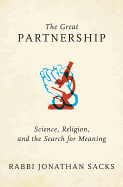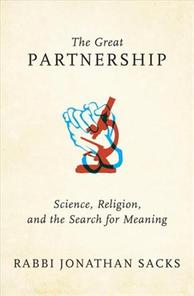
 Near the end of The Great Partnership, Jonathan Sacks, chief rabbi of the U.K.'s main Orthodox movement, admits his aim is not to convert the most ardent supporters of "new atheists" like Richard Dawkins and the late Christopher Hitchens. Instead, he offers serious readers an examination of the most profound issues of faith and science that is both intellectually rigorous and generous in spirit.
Near the end of The Great Partnership, Jonathan Sacks, chief rabbi of the U.K.'s main Orthodox movement, admits his aim is not to convert the most ardent supporters of "new atheists" like Richard Dawkins and the late Christopher Hitchens. Instead, he offers serious readers an examination of the most profound issues of faith and science that is both intellectually rigorous and generous in spirit.
With an impressive range of scholarship that extends far beyond the Jewish tradition--even acknowledging his debt to atheist philosophers like Sir Bernard Williams (with whom he studied at Cambridge)--Sacks marshals an array of arguments for the proposition that "we need both religion and science; that they are both compatible and more than compatible." He strives to convince us religion doesn't require "the abdication of the intellect, a silencing of critical faculties." Whether or not one agrees with all of his conclusions, The Great Partnership is elegant proof of the assertion.
Early in his argument, Sacks sets up a dichotomy between the analytical modes of science and religion, tracing the split to the clash between the left-brained world of the Greek philosophers and the right-brained world of the Hebrew Bible. "Science takes things apart to see how they work," he writes. "Religion puts things together to see what they mean." While he concedes it's possible to live a perfectly happy, moral life without religious faith, he contends that in such a life that essential dimension of meaning is missing.
In prose that's both stately and accessible, Sacks devotes extensive discussion to topics like evolution, the problem of evil and the excesses of religion. He explicitly refrains from offering elaborate philosophical proofs for the existence of God, calling such an effort "misconceived." It's less important for Sacks to prove that a divine being exists than to live as if one does; thus, he mostly avoids direct confrontations with the more polemical statements of Dawkins and company. He does, however, single out for criticism Sam Harris's denunciation of "religious moderates" and call for a hostile encounter between fundamentalists and atheists--the unappealing extremes between which Sacks steers with considerable dexterity.
Whether or not the thinking that animates The Great Partnership sparks the "strong, vigorous, challenging dialogue" Rabbi Sacks welcomes, followers of all the Abrahamic religions will find both inspiration and challenge in this stimulating book--and likely even deeper meaning in their respective faiths. --Harvey Freedenberg
Shelf Talker: A British rabbi sets out to reconcile the worldviews of science and religion in this intellectually stimulating work.

